


A representation of the sun is used as a heraldic charge. The most usual form, often called sun in splendour or in his glory, consists of a round disc with the features of a human face surrounded by twelve or sixteen rays alternating wavy and straight. The alternating straight and wavy rays are often said to represent the light and heat of the sun respectively.
It was used as a badge by Edward II of England, and was later adopted by Edward IV following the appearance of a parhelion or "sun dog" before his victory at the Battle of Mortimer's Cross in 1461 (see also Battle of Mortimer's Cross#Parhelion). It also had significance in alchemy, and may be a symbol of the Roman deity Sol Invictus (Unconquered Sun).
It is a common charge in the heraldry of many countries, regions and cities: e.g. the bearings of Armstrong family in Canada; the Sun in Splendour appears superimposed on the Cross of St. George and behind the White Rose of York on the flag of the West Riding of Yorkshire; and on the arms of Banbury Town Council, England. It also often appears as a rising sun as in the arms of East Devon District Council, England, and as a demi sun as in the coat of Don McLean Aitchison, Canada.
According to historian Diego Abad de Santillán, the Sun of May represents Inti, the Incan god of the sun, and thereby Inca culture. It appears as a heraldic sun in the national flags of Argentina (1818) and Uruguay (1828) and Ecuador (1860), in the flags and shields of the Peru–Bolivian Confederation (1836–1839) and its component the Republic of South Peru, in the flag of Peru of 1822–1825, and in the current flag of the Peruvian Navy (1821).
Examples
| This section needs additional citations for verification. Please help improve this article by adding citations to reliable sources in this section. Unsourced material may be challenged and removed. (January 2009) (Learn how and when to remove this message) |
- Sun in splendour, with face
-
 Arms of Amelot family
Arms of Amelot family
-
 Flag of Argentina
Flag of Argentina
-
 Arms of Arraincourt
Arms of Arraincourt
-
 Arms of Auzeville-Tolosane
Arms of Auzeville-Tolosane
-
 Arms of Basse-Terre
Arms of Basse-Terre
-
 Arms of Bassurels
Arms of Bassurels
-
 Arms of Creisset
Arms of Creisset
-
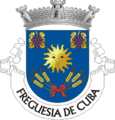 Arms of Cuba (Portugal)
Arms of Cuba (Portugal)
-
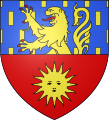 Arms of Dole (Jura)
Arms of Dole (Jura)
-
 Arms of Écija
Arms of Écija
-
 Arms of Ennetbürgen
Arms of Ennetbürgen
-
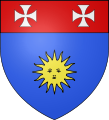 Arms of Fontaines-Saint-Martin
Arms of Fontaines-Saint-Martin
-
 Arms of Känerkinden
Arms of Känerkinden
-
 Arms of Kamianets-Podilsky
Arms of Kamianets-Podilsky
-
 Arms of Khmelnytskyi Oblast
Arms of Khmelnytskyi Oblast
-
 Arms of Loukov
Arms of Loukov
-
 Arms of Mende
Arms of Mende
-
 1822 Flag of Peru
1822 Flag of Peru
-
 Flag of the Philippines (1899-1901)
Flag of the Philippines (1899-1901)
-
 Arms of Sankt Gilgen
Arms of Sankt Gilgen
-
 Arms of El Soleràs
Arms of El Soleràs
-
 Arms of Tarnopol Voivodeship
Arms of Tarnopol Voivodeship
-
 Flag of Uruguay
Flag of Uruguay
-
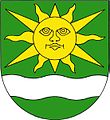 Arms of Vědomice
Arms of Vědomice
-
 Arms of Věžky
Arms of Věžky
-
 Arms of Vinnytsia Oblast
Arms of Vinnytsia Oblast
-
 Arms of Zhytomyr Oblast
Arms of Zhytomyr Oblast
- Sun in splendour, without face
-
 Arms of Archena
Arms of Archena
-
 Arms of Arosa
Arms of Arosa
-
 Arms of Barbâtre
Arms of Barbâtre
-
 Arms of La Baule-Escoublac
Arms of La Baule-Escoublac
-
 Flag of the Colorado Party, in the Uruguayan Civil War
Flag of the Colorado Party, in the Uruguayan Civil War
- Straight rays (mullet)
-
 Arms of Beriáin
Arms of Beriáin
-
 Arms of Dobel
Arms of Dobel
-
 Arms of Galar
Arms of Galar
-
 Flag of Macedonia (Greece) (Vergina Sun)
Flag of Macedonia (Greece) (Vergina Sun)
-
 Flag of the Republic of China (Taiwan)
Flag of the Republic of China (Taiwan)
-
 Flag of Tibet
Flag of Tibet
- Wavy rays (estoile)
-
 Arms of the Diocese of Gothenburg
Arms of the Diocese of Gothenburg
-
 Arms of Jēkabpils District
Arms of Jēkabpils District
-
 Flag of Kazakhstan
Flag of Kazakhstan
-
 Flag of Kyrgyzstan
Flag of Kyrgyzstan
- Without rays (roundel)
- Other forms
-
 Naval Ensign of Japan
Naval Ensign of Japan
-
 Coat of arms of Latvia
Coat of arms of Latvia
-
 Flag of North Macedonia
Flag of North Macedonia
-
 Flag of the Philippines
Flag of the Philippines
-
 Naval Jack of the Philippines
Naval Jack of the Philippines
-
 Emblem of the Philippines
Emblem of the Philippines
-
 Flag of the Székelys, depicting a napcsillag ('sun–star')
Flag of the Székelys, depicting a napcsillag ('sun–star')
-
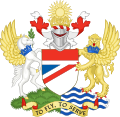 Coat of arms of British Airways
Coat of arms of British Airways
See also
References
- English heraldic tradition of the early modern period associates the star and crescent design with Richard, with his victory over Isaac Komnenos of Cyprus in 1192, and with the arms of Portsmouth (Francis Wise A Letter to Dr Mead Concerning Some Antiquities in Berkshire, 1738, p. 18). Heraldic tradition also attributes a star-and-crescent badge to Richard (Charles Fox-Davies, A Complete Guide to Heraldry, 1909, p. 468).
- James Parker, A glossary of terms used in heraldry. Accessed 13 December 2009
- ^ Dictionary of Vexillology. Accessed 13 December 2009
- Fox-Davies, A.C., (1969) A complete guide to heraldry. Aylesbury: Thomas Nelson and Sons. p. 222.
- Encyclopædia Britannica: Edward IV and the Alchemists. Accessed 13 December 2009.
- Banbury Faith Trail. Accessed 13 December 2009
- "The Public Register of Arms, Flags and Badges of Canada". Governor General of Canada. Archived from the original on 16 June 2012.
- "CIVIC HERALDRY OF ENGLAND AND WALES - THAMES VALLEY AND CHILTERNS". www.civicheraldry.co.uk. Retrieved 3 June 2024.
- "CORNWALL AND WESSEX AREA". Civic Heraldry. Archived from the original on 20 November 2016.
- "The Public Register of Arms, Flags and Badges of Canada". Governor General of Canada. Archived from the original on 16 June 2012.
- Abad de Santillán, Diego (1965). Historia Argentina. Buenos Aires: TEA (Tipográfica Editora Argentina).


